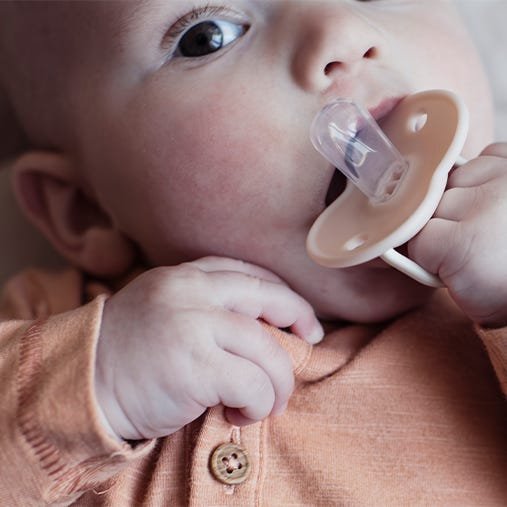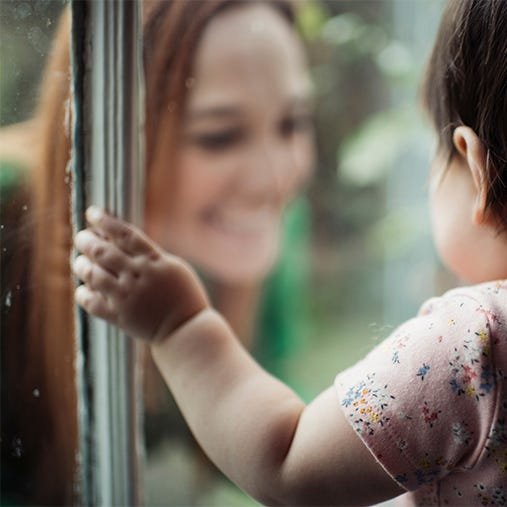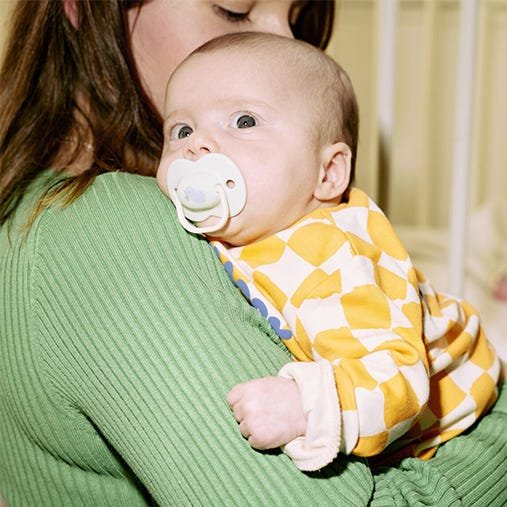All parents will experience a lack of sleep when bringing up their baby. Although unpleasant, it's common for parents to feel bone-tired, especially during the early stages of parenthood. Typically, the peak of sleep deprivation hits during the first three months after a baby is born.
Try not to worry though, it does get better and doesn't last forever. Dealing with a lack of sleep is undoubtedly hard, but you're tough and you'll get through it. We're here to run through what sleep deprivation is, how much sleep parents realistically get, and how to cope with sleep deprivation.
What is sleep deprivation?
Adults are recommended to get seven to nine hours of sleep per night. Put simply, sleep deprivation is when you don't get the right amount of sleep you need, and your body's natural circadian rhythm (the internal 24-hour rhythm which regulates sleeping and waking) is disrupted.
It's very common and can be a short-term issue over one or a few nights, or it can be a chronic concern that lasts for weeks or even months. For parents, it's common for disturbed sleep to be caused by night feeds and other disturbances from their new baby during the night.
How much sleep do parents get?
In the early weeks, it's normal for a baby to wake up every two to three hours. New parents get around five to six hours of sleep and lose around 109 minutes of sleep every night during the first year of their baby's life on average.
What are the effects of sleep deprivation from a newborn or young baby?
The side effects of sleep deprivation and broken sleep after having a baby can vary from one parent to the next, but they commonly include:
- extreme tiredness and daytime sleepiness
- slower response times
- difficulty concentrating, communicating, and making decisions
- feeling grumpy, stressed or more emotional
- clumsiness or disorientation
- being less or more hungry than usual
- headaches, accidents, and injuries
- anxiety and depression.
It's common for everything to feel harder when you're short of sleep. If you're struggling to cope with the symptoms of sleep deprivation, don't hesitate to reach out to your GP or health visitor for advice and support. They will be able to figure out if what you're experiencing is part of normal postpartum fatigue or something requiring medical attention.
How to cope with sleep deprivation as a new parent
You're tough, so you can probably manage disturbed nights with your baby. But if you're feeling low and are struggling to cope, it's important you find a way to get more rest. The following tips may help.
Rest when you can
Many new parents grow to loathe the phrase 'sleep when the baby sleeps'. That said, getting some rest while your baby naps is good advice if you can manage it! If you're concerned about oversleeping during the day, you can always set an alarm, and even a nap that's 10 or 20 minutes long can help you to feel recharged.
If you can't sleep while your little one naps, try to use the time to rest and have a calming bath or put your feet up and lounge on the sofa while watching an episode of your favourite series. The housework and other errands can wait!
You could also give five to 10 minutes of deep relaxation a go. There are lots of breathing techniques out there that may help refresh you when you're feeling sleep deprived, and you can learn them online or in dedicated books.
Understand your baby's sleep patterns
When they're first born, you may struggle to get a grasp of their sleep cycle. But as they grow, they'll sleep for longer periods. And remember, the time when they wake multiple times throughout the night won't last forever.
Reach out for support and accept help
You should never feel afraid to ask your close friends, trusted neighbours, and family members for help when you need some sleep or alone time. Remember to communicate your needs with your partner and make sure that you share responsibilities evenly.
If you're struggling to cope with a lack of sleep, you shouldn't hesitate to talk to your family doctor or health visitor. During this difficult time, you may feel like you're alone, but don't worry, you never are!
Share the night feeds
This point is crucial. If you have a partner to share night feeds with, one of you can feed the baby, while the other catches up on some much-needed sleep.
If you're bottle feeding, you can simply take turns with giving the feeds. And if you're breastfeeding, they can help with changing nappies or dressing the baby in the morning so you can have a well-deserved lie-in. When you've got into the swing of your breastfeeding routine, your partner can occasionally give the baby a bottle of expressed breast milk.
Watch for signs of postnatal depression
Sometimes difficulty sleeping or constantly feeling tired could be a sign of postnatal depression. Not enjoying the things that you normally do and felling low can also be symptoms to look out for.
If you're concerned that you may be suffering from depression, talk to those close to you or contact your health visitor or doctor for support. Don't hesitate, the sooner you reach out, the sooner you can get the support you need.
Do your grocery shop online
Nowadays, most supermarkets offer online ordering and home delivery. Using these handy services is a great way to avoid the stress of the weekly shop and to make some time for a mid-day snooze.
Dim the lights
Bright light and the blue glow of electronic devices too close to bedtime can disrupt your body's natural sleep-wake functions and can interfere with your circadian rhythm. So, it's a good idea to avoid using electronic devices for an hour or more before bed if possible.
Get some light exercise
Staying active during the day by going for a walk or doing some gentle exercises can help with the quality of your sleep.
Create a good sleep environment and bedtime routine
A healthy sleep environment for adults is one that's cool, quiet, and dark. Luckily, the same applies to young babies!
If you live with your partner, it's a good idea to get into the swing of taking turns, so that only one of you is woken during the night. One person can be 'on' and awake, while the other is 'off' and able to sleep soundly, either with earplugs in or in a separate bedroom if possible.
It's also a good idea to establish a set of nighttime rituals so you have time to bond as a family at the end of the day. Every family's routine is different, but it may include things like reading a story together, taking a calming warm bath, and sticking to a regular bedtime to help regulate your body clock.


 £59.99 RRP: £64.99
£59.99 RRP: £64.99 £229.99 RRP: £349.99
£229.99 RRP: £349.99









